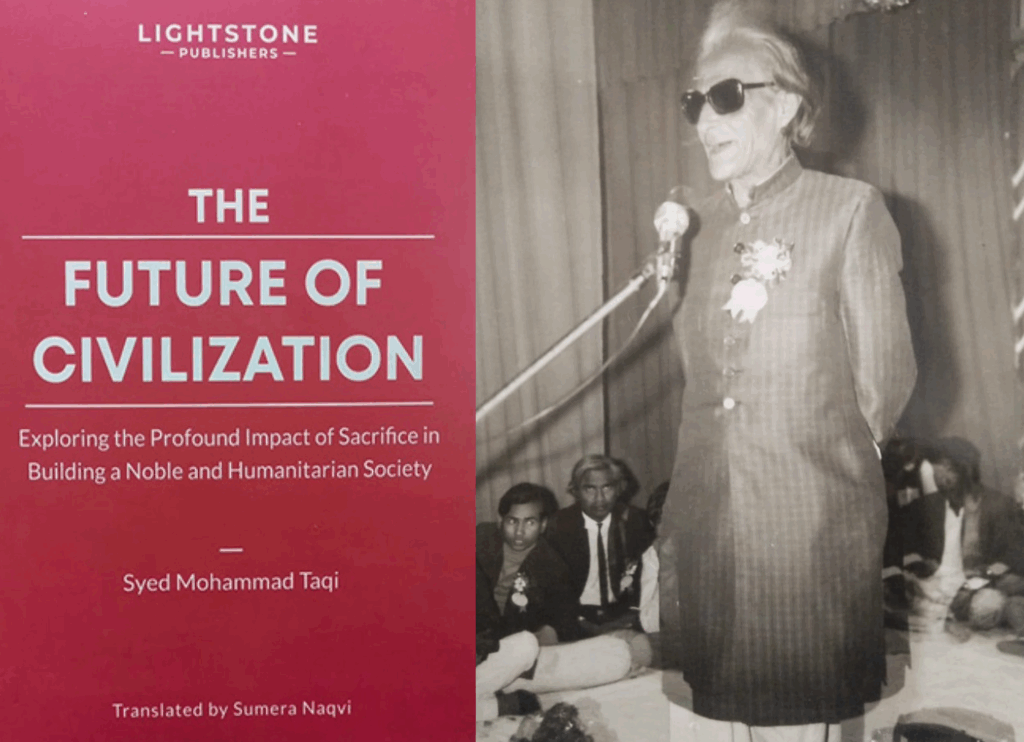Published August 24, 2025
Karachi:
Philosopher, intellectual, author and journalist Syed Mohammad Taqi needs no introduction. Yet, for the sake of those who have weak memories, Taqi was a prominent philosopher, historian, learned, thinker and author and remained editor of Jang for almost twenty -five years. He wrote extensive about topics of philosophy, politics, religion, history, culture, economics, sociology, literary criticism and constitutional theory.
Besides his Magnum Opus book Taarikh Aur Cainat: Mera Nazariya (History and the Universe: My Viewpoint), other books written by him include Mantiq, falsafa aur science (Logic, philosophy and science), ROOH AUR FALSAFA (Soul and philosophy), Hindustan: Pasmanzar Peshmanzar (Hindustan: background and foreground), Nahjul Balagha Ka Tasawwar-e-Ulubiyat (Nahjul Balagha’s concept of divinity. He also translated many books from English to Urdu, among which translation of Karl Marx’s Das capital served him worldwide recognition.
It was a pleasure to receive a copy of the English translation of his book, Karbala: Tehzeeb Ka Mustaqbil (Published in 1980) by his grandson Sumera Naqvi entitled Future of Civilization: Examination of the deep impact of victims in the construction of a noble and humanitarian society.
Naqvi is like her famous grandfather a journalist; She began her career with The news and moved later to Dawn. In 2014, she joined the development sector and worked with mental illness, education and poverty reduction.
The book Karbala: Tehzeeb Ka Mustaqbil dealing with philosophical themes of moral collapse, the modernity crisis and The impact of victims on society, And exploring how the moral operation of modern civilization can be confronted by connecting again with historical heritage – especially the sustained symbolism of Karbala.
Although the events leading to Karbala’s tragedy are discussed in the long run, it must be remembered that it is not a religious book devoted to Karbala’s history but a philosophical book that Brings Karbala’s message to the modern reader, and philosophically analyzing why Karbala, especially Imam Hussain’s timeless stand, was an unmatched moment in human history.
The author claims that “humanity today faces a serious moral deficit that prevents human civilization from developing into a truly noble and humanitarian society. Morality is at the heart of civilization, and moral and ethical values can help make a more liberal and pluralistic society.”
TAQI SAHIB emphasizes the crucial need to find role models in history that has sacrificed monumental victims to maintain civilization values that are instrumental in building a civilized and humanly oriented society. He invites readers to think about the crossing of victims, ethics and the crisis of civilization in our age.
With pervasive insight, the author explores the delicate balance between political power and moral principles, the right to dissent and the true meaning of spiritual leadership. He invites readers to consider how lessons from Karbala can shape our approach to modern ethical dilemmas and social justice.
TAQI SAHIB does not limit his discourse to Imam Hussain’s place in the Muslim community, but also explores his position in the history of civilization. He writes that many noble and religious individuals have throughout history have sacrificed to maintain moral values that are essential to the development of society. He raises the question of whether all men who sacrifice for moral values are considered equally worthy of admiration, he says that the answer to this question is affirmative, but it is important to consider the values behind a victim; It should also be seen what were the values that Imam Hussain sacrifices his life.
The author draws fascinating parallels between Imam Hussain and other significant historical characters such as Socrates and Jesus Christ, who enlighten the unique nature of Imam Hussain’s victim and its sustained relevance. He writes that although the victims and endurance of Socrates and Jesus Christ are kept high in the world by moral values, certain distinctions in their victims cannot be ignored. Hussain’s decision to stand by his values and principles exemplifies high moral and civilizing values in history by balancing good and evil.
In various places during his discussion, the author asks questions that invite readers to consider, and then continues to explain. He builds his arguments, but does not leave judgment, rather leaves it to the reader to accept it or not.
In her translator’s note, Naqvi invites readers to reflect on the point her daughter raised: Should Imam Hussain be portrayed as a victim or savior of the circumstances of Karbala’s tragedy?
Translating a book is not a child’s acting, which for this one needs command of both the original language and the one in which it is translated. And to translate a book of any of the caliber of Syed Mohmmad Taqi is definitely a feat, especially since it is known that Taqi Sahib used to speak and write very polished and complex urdu. Naqvi must be complimented and recognized for his ability to translate it into reader -friendly English while he remains true to the tone and intention. As Naqvi says in his note, “It’s a work of love for my grandfather,” and it took her more than two years to translate it.
Rizwana Naqvi is freelance journalist and tweets @naqviriz; She can be reached at [email protected]
All facts and information is the author’s sole responsibility



